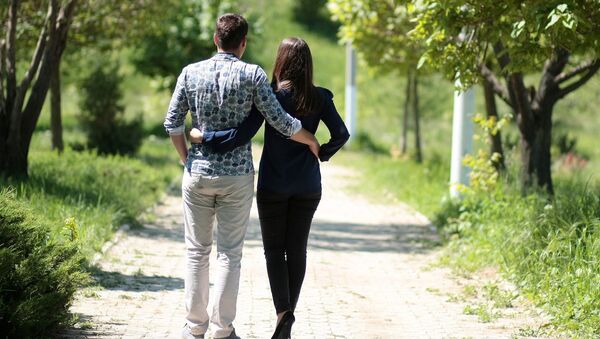Talking about how it all started, Naoko told Sputnik that before she met her husband she was living in Sapporo where she was studying at the Hokusei Gakuen University, learning Russian.
“Russia was a completely new country for me. I was very interested in its culture. Besides, the more I studied Russian, the more I liked it,” Naoko said.
In 1992 she got an opportunity to live with a host family for a month to study Russian in Moscow.
Naoko liked Russian people. She recalls how they would approach her in the streets and ask if she needed any assistance with reading the metro scheme or understanding directions. The kindness and caring nature of Russians won her heart.
She first met Dennis Isaev, her future husband, at a get together that was organized by the language society which she had joined to practice her Russian language.
At that time Dennis was an intern at Hokkaido University. The two started to get to know each other and eventually fell in love. It was all “very natural” Naoko noted.
Talking about what attracted Naoko to Dennis, she said, “He is very kind and a good man. I always wanted to marry a man who would support me in all my endeavors; even if everyone around me would say that I won’t be able to do it. Dennis is just like that. Nationality is not important for me. I love him, not because he is Russian, but because he is he.”
In 1994 Naoko came to Moscow to continue her education. She enrolled at the Faculty of Russian Language and Literature at People's Friendship University and in 1997, Naoko and Dennis got married.
Currently, they live in Moscow. Dennis works as a sports journalist on the Eurosport channel.
Recalling her family’s reaction when she told them that she wanted to marry a Russian man, Naoko said that no one in her family was against it.
“Before marriage, Dennis and I had dated for 4 years and during that time I introduced him to all of my family. Everyone liked him. The question of Dennis’s nationality never arose.”
“However, we are not that different,” Naoko adds quickly, “Perhaps someone wants to hear how our cultures are not similar to each other’s, but it is not so. With my husband I never felt cultural and behavioral barriers. In the end, love is what brings people together.”
Looking at the behavior of Russian and Japanese people as a whole, Naoko said that Japanese people are more shy or conservative.
“They do not kiss in public and the maximum they do in public is hold hands. The love of a Japanese person can be seen in their eyes. One look can tell you if they are in love or not. However, I do not think it depends on the mentality of the nation. Rather, it is a question of upbringing,” Naoko said.
She went on, “In Russia, you can see couples really kissing in public, but there are also those who don’t do it. I think if a person is intelligent, they will not kiss in public,” she added.
Talking about their children, Naoko said that they have a son who is 11 years old and daughter who is 7. They speak both Russian and Japanese. They are also aware of festivals and cultural events of both countries.
“Our family tries to observe all the holidays, Japanese and Russian. On February 3, we celebrate Setsubun and in the spring, Easter. We paint eggs and go to the church,” Naoko said.
She hopes that this sort of upbringing will help her children avoid discrimination. There are different people and diverse cultures. The person will have a very hard time if he considers that only his truth in the world is the right one.
“I teach my children kindness. I strive to teach them that the identity of the person is important and not their nationality. So I try to do everything possible so that they grow up to be very deep people.”
For those couples who intend to marry outside of their culture, Naoko advised to be patient and have the ability to forgive shortcomings.
“In principle, this can be said of any marriage not only about intermarriage. However, if your love is true, then everything will work out. All difficulties can be overcome,” Naoko concluded.






